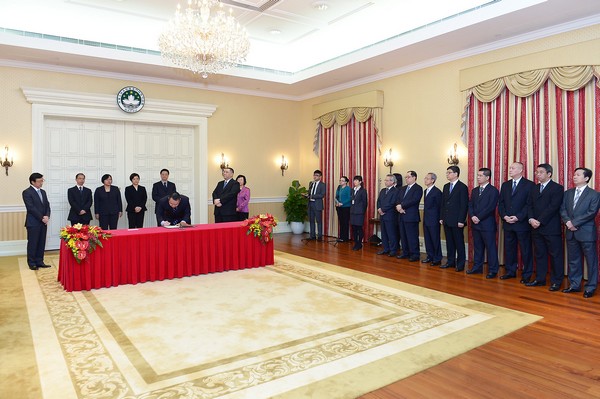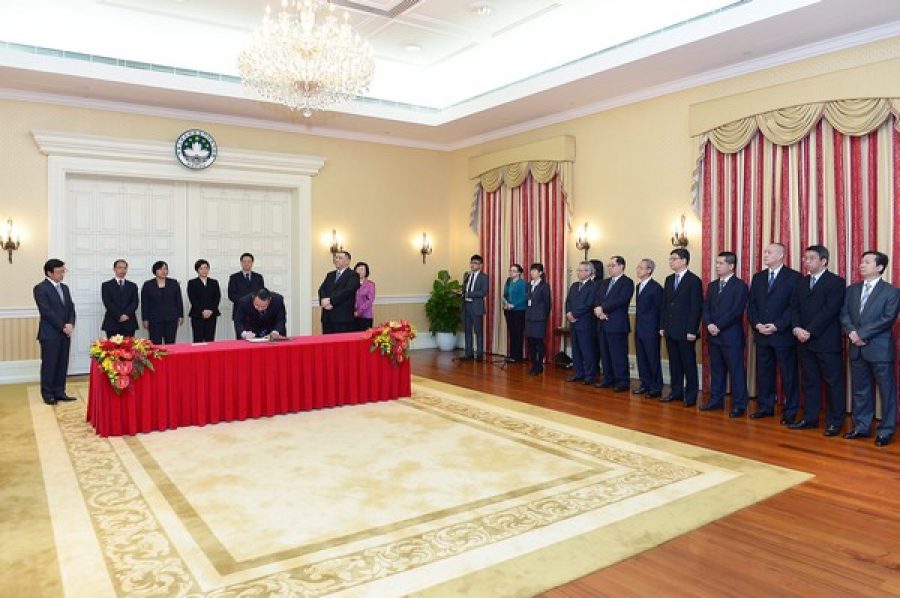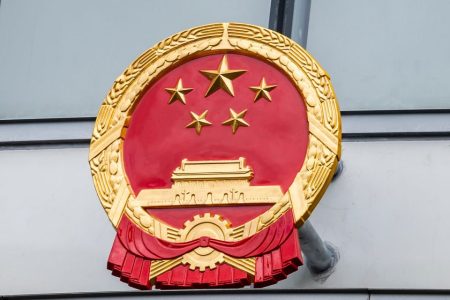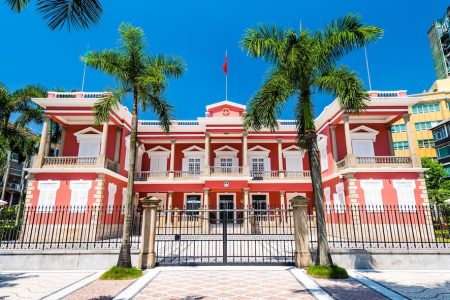Newly-appointed Chief Executive Electoral Management Committee President Song Man Lei said Monday that the city’s 825 associations which have the right to elect representatives to vote in the upcoming chief executive election can ask from April 14 for application forms for the election of 344 of the 400-member Chief Executive Election Commission.
She also said that applications for taking part in the election of members of the Chief Executive Election Commission must return their forms between May 7 and May 20.
Song, one of the three Court of Final Appeal (TUI) judges, made the announcement after the first meeting of the five-member committee at the Public Administration Building in Rua do Campo.
Chief Executive Fernando Chui Sai On announced in Monday’s Official Gazette (BO) the five-member list of the committee which will be responsible for the chief executive electoral affairs. Apart from Song, the other members are Assistant Public Prosecutor-General Ma Iek, Court of First Instance (TJB) President Ip Son Sang, Public Administration and Civil Service Bureau (SAFP) Director Jose Chu and Government Information Bureau (GCS) Director Victor Chan Chi Ping.
According to The Macau Post Daily, Chief Executive Fernando Chui Sai On presided over Monday’s swearing-in ceremony for the newly-appointed members at Government House.
Chui’s current five-year term will end at midnight on December 19. Macau’s chief executive can only serve two successive five-year terms.
The election of 344 of the 400 members of the Chief Executive Election Commission will be held on June 29, according to a previous government announcement.
Summarising yesterday’s hour-long closed-door meeting, Song said that the members had discussed the format of the forms to be used in the election of the commission.
“As the election of members of the Chief Executive Election Commission will be held on June 29 and, thus, the committee has fixed the dates of several agendas such as that from April 14 any of the [825] associations which are interested in the election can ask for a form … and the period for submitting the forms will be from May 7 to May 20,” Song said, adding that the committee will set up a secretariat which will include GCS staffers.
Song also said she expected the committee to hold a meeting once a week.
Being asked by reporters after the swearing-in ceremony as to what the committee would do to ensure that the upcoming election will be fair and open, particularly as Chui could be assumed to have an advantage due to his current position over any possible challengers, Song said that the committee would treat each chief executive candidate fairly.
Early last month, Chui told the media that he would seek re-election and that he would make his official announcement at an “appropriate time”. After Chui’s announcement, a number of associations which have the right to vote expressed their support of Chui.
No challenger has so far come forward. While former chief executive Edmund Ho Hau Wah has said he is backing Chui’s re-election bid, Legislative Assembly President Ho Iat Seng has said that he will support any candidate meeting all the requirements enshrined in the Basic Law.
“The electoral law ensures the election [of the chief executive] to be fair… I believe the media will supervise the work of the committee and this will make sure that the election is fair and just,” Song said.
According to official figures provided by the Public Administration and Civil Service Bureau (SAFP), the 825 associations include 99 associations from the manufacturing, commerce and finance sectors, 137 from the culture sector, 313 from the sports sector, 132 from the social service sector and the remaining from the education, professional and labour sectors.
Each association has up to 22 votes.
Each association must obtain no less than 20 percent support from the sector they represent to be able to take part in the election of members of the Chief Executive Election Commission.
The commission comprises 400 members, including 120 elected from the city’s manufacturing, commercial and financial sector, 115 from the culture, education, professional and sport sectors, 115 from the labour, social services and religious sectors, as well as 50 from the Macau Legislative Assembly (AL), local deputies to the National People Congress (NPC) and the National Committee of the Chinese People’s Political Consultative Conference (CPPCC).
According to the Chief Executive Election Law, 56 seats of the commission such as for members of the local legislature, local deputies to the NPC and CCPPCC and the religious sector need not go through elections but may be selected through “negotiations” or are ex-officio members. While all of Macau’s 12 NPC deputies are ex-officio members of the commission, only 22 of the Macau Legislative Assembly (AL) can join it. The 33 lawmakers will hold an internal vote on the matter. The commission will also include 16 CPPCC members. The about three dozen local CPPCC members will also hold an internal election to choose their members on the commission. There will also be six representatives of religious groups on the commission whose membership will be decided by “negotiations.”
According to the Chief Executive Election Law, the election of the members of the commission should be held at least 60 days before the election of the chief executive. Consequently, the earliest date of the election of the chief executive would be the last Sunday of August – August 31.
An informed source told The Macau Post Daily that the election of the chief executive will be held on a Sunday at the end of August or early September.
According to the Chief Executive Election Law, the election must be held on a Sunday.
To become a candidate in the election of the chief executive the applicant must obtain at least 66 nominations, amounting to one sixth of the total members of the 400-head commission.
The commission members will vote by secret ballot.(macaunews)






